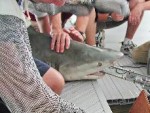A whale (shark) of a tale

A USF researcher has been a popular guest on national television in recent weeks, and he hopes the publicity now surrounding his research on marine mammals – which could make everyday products more efficient – will generate public support and further his study.
NBC’s The Today Show recently featured USF biology professor Philip Motta for his work with whale sharks. This appearance was the latest of several television features, which will also include National Geographic a documentary this spring. Media coverage is crucial for researchers to raise awareness for their cause and attract much needed funds, Motta said.
“Publicity is good for grants,” Motta said. “The granting agencies need to see it; they want public outreach.”
Motta’s work with sharks and rays covers a broad variety of topics from feeding behavior to anatomical evolution. His recently publicized research focuses on the feeding habits of whale sharks. These massive creatures use suction feeding to engulf and filter plankton, he said.
While studying shark behavior, Motta sometimes found himself in close quarters with his subjects. Although whale sharks will not attack humans intentionally, the work carries a unique danger.
“Whale sharks are basically harmless, except when you get in their way because they are the size of a school bus,” Motta said.
“You don’t want to get in front of them because they will just run you over.”
Motta’s work with whale sharks is what he calls basic science: research for the sake of knowledge, not to acquire practical uses. His previous work, however, had very real applications.
“We did work for the U.S. Navy where we analyzed bites on the towed arrays behind nuclear subs,” he said. “Nuclear subs put out these towed arrays to listen to enemy ships and so on, and [the arrays] are bitten by sharks and other fish.”
Motta and his colleagues had to discover what was attacking the arrays and why marine life was attracted to the sophisticated equipment. Although he accomplished his task, he was hesitant to share the details.
“Uh, well, some of it is classified,” he said.
The expertise that attracted the Navy’s attention has drawn a myriad of news outlets over the years.
“Discovery Channel filmed us, Animal Planet filmed us, The Today Show a little bit, National Geographic too,” he said.
Motta’s work involves the Mote Marine Laboratory, a local research lab and aquarium that has a long history of partnership with USF.
“My collaboration with Phil Motta goes back to the day I came to Mote,” said Robert Hueter, director of Mote’s Center for Shark Research. “We struck up a collaboration and friendship that has been extremely productive over the last 20 years.”
Hueter, who said Motta has been on “every major network and program you can imagine,” can also attest to the benefit of national press coverage.
“It is amazing, the power of interviews to raise awareness for what you are doing,” he said. “It separates us from scientists that don’t want to bother with public communication.”
Motta said he hopes public knowledge of his work will lead to private donations, which are crucial to fill in the gaps between grants.
“Any small, private donation is extremely beneficial,” he said.
The first step is to gain public interest in their research.
“There’s no point in doing the science if the public doesn’t see it,” he said.
If Motta can acquire the funding, his future research is sure to draw network cameras yet again. He believes that shark scales have evolved to reduce drag and allow the mammals to speed through the water.
“If we can demonstrate with engineers that shark scales truly reduce drag, the implications are great,” Motta said. “We could put them on ships, on torpedoes, man-made underwater vehicles. You could talk about major energy savings. That has a lot of potential.”






